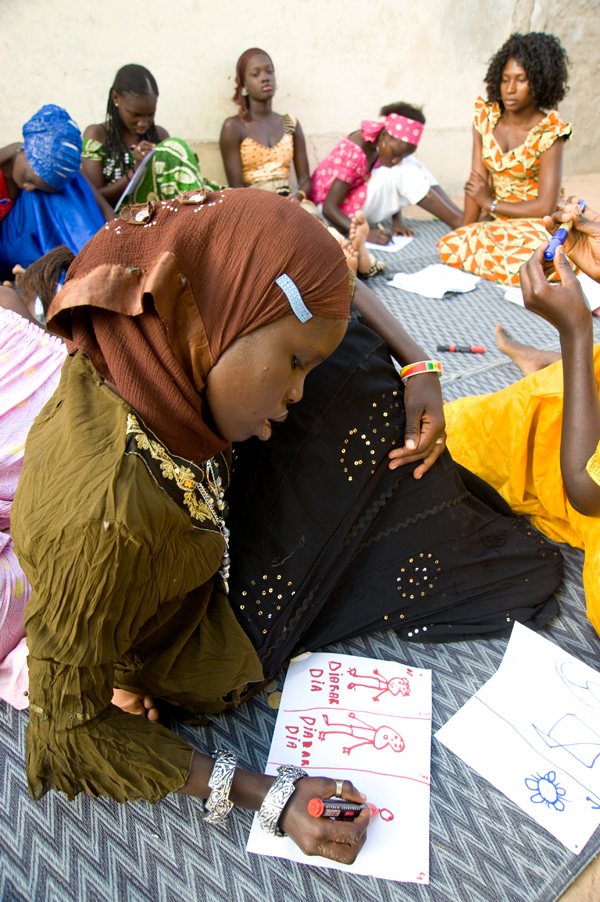When Esther Kuhn was a graduate student in Toronto last year, her dissertation involved a study of seasonal gold miners in Mali. Workers who were unable to find day labor and farmers who are idle in the dry season would join a highly organized group of employees and supervisors who dig for gold year-round in pit mines near the Niger River basin, between the capital, Bamako, and the Guinea border. These seasonal workers are able to support themselves by mining gold when it’s too hot and dry to grow crops.
When Esther Kuhn was a graduate student in Toronto last year, her dissertation involved a study of seasonal gold miners in Mali. Workers who were unable to find day labor and farmers who are idle in the dry season would join a highly organized group of employees and supervisors who dig for gold year-round in pit mines near the Niger River basin, between the capital, Bamako, and the Guinea border. These seasonal workers are able to support themselves by mining gold when it’s too hot and dry to grow crops.

“Traditionally, local artisans would fashion the mined gold into jewelry or sculpture,” Kuhn says. “But today the gold is sold almost immediately just outside the mine gates at two thirds of the market value. The work is profitable for those in management positions like ‘Chief of the Mine,’ but for those who are subsistence earners, income from mining is an economic lifeline for several months each year.”
In mid-July, Kuhn left her studies in Toronto to unearth a different kind of gold, working with women and adolescents in Senegal as a Program Consultant for the Christian Reformed World Relief Committee (World Renew/CRWRC). Her work, implemented through the Evangelical Lutheran Church and a Protestant coalition, will help uncover the untapped gifts, talents, and potential of people in poor communities who have previously had little opportunity for learning or employment.
One of Kuhn’s major tasks is starting a four-year program funded by the Canadian International Development Agency (CIDA) as part of a $1.678 million grant awarded to CRWRC in January 2012 for work in Senegal and Nigeria. Kuhn’s projects will focus on improving health, security, and life skills among adolescents, especially girls, in 31 low-income rural communities and the urban neighborhoods of Dakar where lack of education, opportunities, and personal power are the norm.
CRWRC has been working in Senegal for more than 20 years, partnering with minority Christian organizations and denominations like Evangelical and Lutheran churches to make a lasting difference in the lives of those who are poor and marginalized through education in literacy, health, human rights, peace-building, and civic responsibility.
In the expansion of this work over the next four years, Kuhn and CRWRC partners in Senegal will work with adolescent groups to teach healthy behaviors that reduce the threat of HIV, sexually transmitted diseases, and early or unwanted pregnancies. The project focuses on giving teens, especially girls, knowledge that helps protect them from violence, exploitation, and sexual abuse. In addition, participating youth will have opportunities for literacy education and vocation training.
While these programs directly benefit 3,500 adolescents through more than 200 peer educators, they also encourage participants to improve communication with family members, friends, and their community about reproductive health issues and rights to help build their confidence, communication skills, and decision-making abilities. Encouraging open communication helps create safety for children and adolescents through 40 community-based parent groups, improves connections with local government health facilities and provides opportunities to identify and map areas where the most intervention is needed.
The project also helps teens improve their lives through literacy and vocational training, providing nearly 3,000 participants with literacy, numeracy, and computer skills as well as health and rights information. Some of these participants will also receive instruction in vocational trades like tailoring and hairdressing. One person who can attest to the skills and confidence she acquired through CRWRC's work in Senegal is Awa Sarr who graduated from an adolescent health class last year.
For Esther Kuhn, that is unearthing gold.

